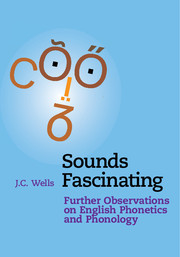7 - Abroad
from PART I - WORDS, NAMES, PEOPLE, AND PLACES
Published online by Cambridge University Press: 05 September 2016
Summary
Sichuan
There is a Chinese province known in English as Szechuan, Szechwan, or Sichuan. Although we are now encouraged to write this name as Sichuan, the older spellings Szechuan and Szechwan are still widely used, together with the pronunciation ˌsetʃˈwɑːn that they suggest. The OBGP calls this an ‘established anglicization’, but nevertheless recommends səˈtʃwæn. In LPD I give ˌsɪtʃˈwɑːn.
I have also, though, heard Americans speak of ˌʃeʃˈwɑːn. You can see how the spelling Szechuan might produce this – if we give sz its Polish value and ch its French value.
In tone-marked Hanyu Pinyin it is written Sìchuān. The Mandarin pronunciation is 4sɯ 1ʈʂʰwan, where the symbol ɯ represents an alveolar approximant with back unrounded resonance [zɯ] or an alveolarized back unrounded vowel [ɯz] (the sinologists’ phonetic symbol – not recognized by the IPA – for this unusual vowel is ɿ).
The Chinese written form of its name consists of the character for ‘four’, 四, followed by the character for ‘river’, 川. So the meaning is the straightforward ‘four rivers’.
L'Aquila
In 2009 the Italian city of L'Aquila was devastated by an earthquake. To begin with, BBC presenters and newsreaders reporting this event called the city læˈkwiːlə, and even reporters on the spot got it wrong.
One, who had hastened to Italy to address us from among the ruins, gave it the more rarefied pronunciation læˈkiːlə, as if it were a Mexican liqueur. We ought, of course, to pronounce it with the stress on the first syllable. In Italian phonetics, it's ˈlakwila.
At the time there was some criticism of the BBC's Pronunciation Unit, whose proclaimed purpose is ‘to ensure that pronunciations used on the BBC are accurate and consistent’. The fault lay, however, not with the Unit, but with newsreaders and reporters who had not bothered to consult the advice it provides. For L'Aquila the Unit recommends the anglicization ˈlækwɪlə.
Once upon a time any educated person had some knowledge of Latin. Not any more. But classicists will tell you that the Latin word for ‘eagle’, the origin of this name, is ăquĭla (with a short i). As many readers will know, a Latin word in which the penultimate vowel is short and in an open syllable is stressed on the antepenultimate.
- Type
- Chapter
- Information
- Sounds FascinatingFurther Observations on English Phonetics and Phonology, pp. 52 - 54Publisher: Cambridge University PressPrint publication year: 2016

